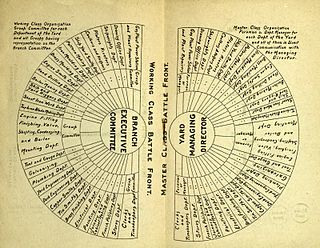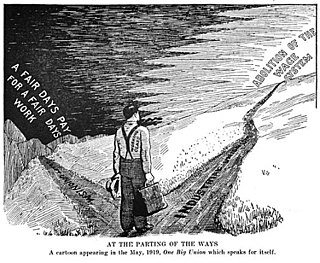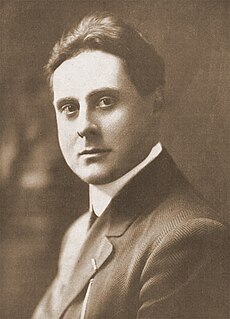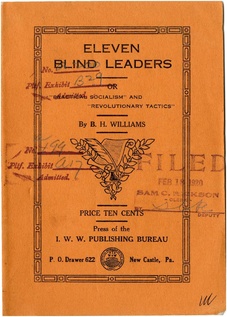Solidarity was a newspaper published by the Industrial Workers of the World from 1909 to 1917. It was the official periodical of the organization in its early years. It was born as part of the McKees Rocks strike in 1909, initially by the IWW's Pittsburgh-New Castle Industrial Council. During the IWW's involvement in the local steel industry in New Castle and in Butler, Pennsylvania, the entire editorial and production staff of Solidarity was jailed. [1]
Over the years, Solidarity had many different editors. Publication was carried on in New Castle, Pennsylvania. By April 1913, publication had moved to Cleveland, Ohio, where it remained until March 3, 1917. The newspaper began publishing in Chicago, Illinois, on March 10, 1917.
The first issue of Solidarity was published on December 18, 1909, and publication lasted until March 18, 1917. [2] In November, 1917, publication of Solidarity was suspended and replaced by Defense News Bulletin, which chronicled the IWW's legal campaign to defend union members and leaders who had been arrested under the government's anti-syndicalism campaign. Defense News Bulletin continued publication until July 1918. [3]
The following members of the Industrial Workers of the World were editors of Solidarity: [4]

The Industrial Workers of the World (IWW), members of which are commonly termed "Wobblies", is an international labor union that was founded in 1905 in Chicago, Illinois, in the United States. The union combines general unionism with industrial unionism, as it is a general union, subdivided between the various industries which employ its members. The philosophy and tactics of the IWW are described as "revolutionary industrial unionism", with ties to both socialist and anarchist labor movements.

Ralph Hosea Chaplin (1887–1961) was an American writer, artist and labor activist. At the age of seven, he saw a worker shot dead during the Pullman Strike in Chicago, Illinois. He had moved with his family from Ames, Kansas to Chicago in 1893. During a time in Mexico he was influenced by hearing of the execution squads established by Porfirio Díaz, and became a supporter of Emiliano Zapata. On his return, he began work in various union positions, most of which were poorly paid. Some of Chaplin's early artwork was done for the International Socialist Review and other Charles H. Kerr publications.

William Ernst Trautmann was founding general-secretary of the Industrial Workers of the World (IWW) and one of 69 people who initially laid plans for the organization in 1904.

Industrial unionism is a labour union organizing method through which all workers in the same industry are organized into the same union—regardless of skill or trade—thus giving workers in one industry, or in all industries, more leverage in bargaining and in strike situations. Advocates of industrial unionism value its contributions to building unity and solidarity, many suggesting the slogans, "an injury to one is an injury to all" and "the longer the picket line, the shorter the strike."
Labor aristocracy or labour aristocracy has at least four meanings: (1) as a term with Marxist theoretical underpinnings; (2) as a specific type of trade unionism; (3) as a shorthand description by revolutionary industrial unions for the bureaucracy of craft-based business unionism; and (4) in the 19th and early 20th centuries was also a phrase used to define better-off members of the working class.

The Industrial Worker, "the voice of revolutionary industrial unionism," is the magazine of the Industrial Workers of the World (IWW). It is currently released quarterly. The publication is printed and edited by union labor, and is frequently distributed at radical bookstores, demonstrations, strikes and labor rallies. It covers industrial conditions, strikes, workplace organizing experiences, and features on labor history. It used to be released as a newspaper.
Melvyn Dubofsky is professor emeritus of history and sociology, and a well-known labor historian. He is Bartle Distinguished Professor of History and Sociology at the Binghamton University.

The American Labor Union (ALU) was a radical labor organization launched as the Western Labor Union (WLU) in 1898. The organization was established by the Western Federation of Miners (WFM) in an effort to build a federation of trade unions in the aftermath of the failed Leadville Miners' Strike of 1896. The group changed its name from WLU to the more familiar ALU moniker in 1902 at its fifth annual convention. The group had a peak membership of about 43,000 — of which 27,000 were members of the WFM. The ALU was a precursor to the Industrial Workers of the World (IWW), established in 1905, which effectively terminated it.
Wobbly lingo is a collection of technical language, jargon, and historic slang used by the Industrial Workers of the World, known as the Wobblies, for more than a century. Many Wobbly terms derive from or are coextensive with hobo expressions used through the 1940s.

The Industrial Workers of the World (IWW) is a union of wage workers which was formed in Chicago in 1905 by militant unionists and their supporters due to anger over the conservatism, philosophy, and craft-based structure of the American Federation of Labor (AFL). Throughout the early part of the 20th century, the philosophy and tactics of the IWW were frequently in direct conflict with those of the AFL concerning the best ways to organize workers, and how to best improve the society in which they toiled. The AFL had one guiding principle—"pure and simple trade unionism", often summarized with the slogan "a fair day's pay for a fair day's work." The IWW embraced two guiding principles, fighting like the AFL for better wages, hours, and conditions, but also promoting an eventual, permanent solution to the problems of strikes, injunctions, bull pens, and union scabbing.
The Industrial Pioneer was a monthly publication of the Industrial Workers of the World (IWW). It was published in Chicago by the general executive board of the IWW from 1921 to 1926, under various editors. The precursor of the Industrial Pioneer was the One Big Union Monthly. The editor of One Big Union Monthly, John Sandgren, used his position to wage war on the Communists in the IWW. When his editorials became too sectarian, the IWW replaced him as editor in 1931, and changed the name of the publication to the Industrial Pioneer. The new editor was a Communist, however, and this alienated the non-Communist majority of IWW members. He was removed as editor in 1922.

Frank Bohn was an advocate of industrial unionism who was a founding member of the Industrial Workers of the World. From 1906 to 1908 he was the National Secretary of the Socialist Labor Party of America, before leaving to join forces with the rival Socialist Party of America. After World War I his politics became increasingly nationalistic and he left the labor movement altogether.
The Agricultural Workers Organization (AWO), an organization of farm workers throughout the United States and Canada, was formed on April 15, 1915, in Kansas City. It was supported by, and a subsidiary organization of, the Industrial Workers of the World (IWW). Although the IWW had advocated the abolition of the wage system as an ultimate goal since its own formation ten years earlier, the AWO's founding convention sought rather to address immediate needs, and championed a ten-hour work day, premium pay for overtime, a minimum wage, good food and bedding for workers. In 1917 the organization changed names to the Agricultural Workers Industrial Union (AWIU) as part of a broader reorganization of IWW industrial unions.
The Industrial Workers of the World (IWW) is a union of wage workers which was formed in Chicago in 1905. The IWW experienced a number of divisions and splits during its early history.
The Industrial Union Bulletin was a newspaper published by the Industrial Workers of the World (IWW), a labor union.
James H. Walsh was an American labor organizer and a prominent Wobbly.

Benjamin "Ben" Hayes Williams was a leader of the Industrial Workers of the World.
A. S. Embree, a former minister, was an experienced American union organizer and, briefly, a leader of the Industrial Workers of the World (IWW). Embree served as the secretary-treasurer pro tem of the national IWW for a period of two months after the national office was raided by federal agents.

A general strike is a strike action in which a substantial proportion of the total labour force in a city, region, or country participates. General strikes are characterised by the participation of workers in a multitude of workplaces, and tend to involve entire communities. General strikes first occurred in the mid-19th century, and have characterised many historically important strikes.